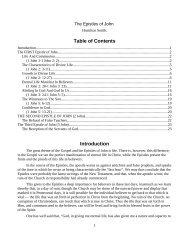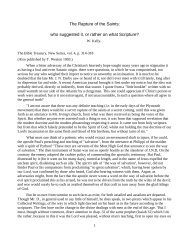An Exposition of Revelation .pdf
An Exposition of Revelation .pdf
An Exposition of Revelation .pdf
You also want an ePaper? Increase the reach of your titles
YUMPU automatically turns print PDFs into web optimized ePapers that Google loves.
after the church closes its history on earth, during a brief crisis <strong>of</strong> exceptional judgments.<br />
Hence the comprehensive term is clearly employed with divine wisdom, "to show to his<br />
bondmen the things which must shortly come to pass" Remark that it is not "the things which are<br />
about to come to pass," which is exactly right in ver. 19, where, after the past vision, the present and<br />
the future are distinguished. Here it is to show His bondmen "the things which must come to pass<br />
shortly." If Jonah was sent with a warning <strong>of</strong> minatory character to arouse Nineveh to repent and thus<br />
escape their threatened ruin, John was to show the things which, as the guilt was intolerable, must<br />
(δεῖ) come to pass shortly. The apostasy <strong>of</strong> Christendom entails not conditional threats, but necessary<br />
and inevitable judgments. The critical facts are disclosed in which we see the church condition set<br />
aside because <strong>of</strong> its final and utter failure to shed the light <strong>of</strong> the sanctuary, till its last phase becomes<br />
so nauseous that the. Lord spues it out <strong>of</strong> His mouth. Then follow judgments on the world with strokes<br />
<strong>of</strong> ever-increasing severity, in which God was about to maintain the glory <strong>of</strong> the firstborn, whom He at<br />
length introduces personally into the world to reign.<br />
"<strong>An</strong>d he sent and signified (it) through his angel to his bondman John." Sons <strong>of</strong> God are not<br />
contemplated as such, but bondmen <strong>of</strong> Jesus. Again, "angel" is not without the best reason named with<br />
the revelation which God here gives. In the Gospel we read <strong>of</strong> eternal life in the Son, and this by the<br />
grace <strong>of</strong> God given to the believer; as the Holy Ghost was the only One competent to minister and<br />
effectuate such grace according to the counsels <strong>of</strong> God, and in the ordering <strong>of</strong> His love. The judicial<br />
character <strong>of</strong> the <strong>Revelation</strong> calls for a quite different style <strong>of</strong> communication, and reserve replaces the<br />
intimacy <strong>of</strong> grace. The intervention <strong>of</strong> "His angel" is therefore to be thus accounted for, as in itself it<br />
was fitting.<br />
Here we have visions in display <strong>of</strong> God's judicial ways, visions <strong>of</strong> judgment which He would<br />
inflict on the ever-growing iniquity <strong>of</strong> man when ripe. In the Gospel John may speak, but he speaks as<br />
one who had seen, and above all heard, the Lord — one who could bear his own testimony for<br />
whatever he utters. He may speak but seldom <strong>of</strong> himself, and efface himself otherwise so effectually,<br />
that there are not wanting those who question whether after all the writer could be "the disciple whom<br />
Jesus loved." The doubt is quite unfounded certainly; but none can charge John with putting himself<br />
forward by the manner in which he writes. So too in his Epistles, which contemplate the Christian<br />
company, or a family, or a friend, the one aim is to place the children <strong>of</strong> God in immediate<br />
communion with the Father and the Son. The inspired apostle wrote them all, no doubt, and the<br />
various members <strong>of</strong> God's family, as well as the servants <strong>of</strong> the Lord, are owned in their place. But<br />
therein He who is God our Father manifestly instructs, comforts, and admonishes His own.<br />
But here we meet intervention on every side. God gives a revelation <strong>of</strong> Jesus to show to His<br />
bondmen the things which must shortly come to pass; and Jesus passes it on through His angel to His<br />
bondman John; and John testifies accordingly. Thus we have all sorts <strong>of</strong> links in the chain, and we<br />
may ask why. For it is novel, especially in the New Testament. How comes this remarkable<br />
introduction <strong>of</strong> the revelation <strong>of</strong> Jesus Christ which God gave to Him, and from Him through an angel<br />
to one bondman to show the future to His other bondmen? How is it that we here miss the direct<br />
dealing with us, the immediateness <strong>of</strong> address which is our portion elsewhere? The reason, as solemn<br />
as it is instructive, is implied indeed in the analogy <strong>of</strong> the Old Testament; for God did not always<br />
address His people there. Yet habitually God's messengers were sent to Israel, even when prophets<br />
were raised up. At first all addressed the people in His name. The word <strong>of</strong> Jehovah was sent to<br />
Jehovah's people. But what an affecting change took place when the message became indirect? See the<br />
book <strong>of</strong> Daniel as the fullest pro<strong>of</strong> <strong>of</strong> it. <strong>An</strong>d no doubt it was really meant for the people; but God<br />
gave it to Daniel, and only so.<br />
4






